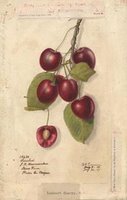Counting Cherry Stones: The Grocer's Daughter
 “Tinker, Tailor, Soldier, Sailor, Rich man, Poor man, Beggarman, Thief.”
“Tinker, Tailor, Soldier, Sailor, Rich man, Poor man, Beggarman, Thief.”It’s a rhyme for counting cherry stones. A kind of game.
You count the stones and they tell you who will be your husband. Or rather his occupation, which amounted to the same thing for those of an age to play it. It’s from a time before mine, when girls – or at least the particular girls likely to have leisure for such games – were expected to take husbands (not partners, not girlfriends, nor to live in glorious solitude). And from a time too, when the equivalent rhyme for those particular girls didn’t let them count too many cherries.
It’s cherry season here in a dangerously over-heated summer. I’m counting stones, but the types turning over in my head don’t come from the rhyme.
Grocer’s Daughter, Rosie the Riveter, White-Feather Wielder, Downtrodden Woman.
My typology is no more exhaustive than that of the original rhyme. The world of the cherry stone is contracted. Compressed. In each case, however, something is going on with women (and maybe, ‘womanhood’) and something is going on with war (and perhaps also with the institutions that organise it). So let us take a closer look at these types, these tropes, these cherry stones. Although real women inhabit them from time to time they are not real. Do not let that deter you: it is their irreality which might illuminate. War is also a fiction: it requires the suspension of disbelief. Pretences must be made and accepted; lies told and acquiescence given. Let’s begin with the Grocer’s Daughter.
The Grocer’s Daughter
“A world without nuclear weapons would be less stable and more dangerous for all of us,” she said straightfaced. Or possibly with an wry smile, over a cup of tea in a bone china service. With lemon.
The Iron Lady not for turning, the woman on top, making the hard-hitting decisions with the hardest of them. Playing with the boys’ toys. She owes nothing to ‘Women’s Lib’ (though her existence will be used to dismiss persistent inequalities – ‘Look at the Grocer’s Daughter! She made it, didn’t she?’).
She’ll drink deep at the well of domesticity when it suits though: what was that she said? Oh yes. “Any woman who understands the problems of running a home will be nearer to understanding the problems of running a country.” The deployment of domesticity here is no accident: it allows the female ‘leader’ to position herself / be positioned as a ‘proper woman’ – a wife, a mother. Her construction as spousal helpmeet or mother relies more on her femaleness than the presence or absence of actual spouse and children. Indeed, sometimes this construction can work better in their absence, since that strengthens the idealised familial bond between the grocer’s daughter and the state. She has no husband: she is wedded to the nation. She has no children: she is mother to the state. The personal subsumed utterly in the political. Her status as exception more obviously evident.
When she supports, orders or advocates the killing of other people’s children, however, this is seldom taken to reflect on her own construction as maternal. Rather it is evidence of her toughness, her firm grasp on Realpolitik. She is able to transcend women’s sentimental weaknesses: she is worth taking seriously. Alone of all her sex.
Yes, its essentialist – it’s the undiluted essence of essentialism, the real deal – but that’s the whole point. What toughness won’t cover, this brand of maternalism will and vice versa. They reinforce each other, they lend each other credibility.
Grocer’s daughters are rare, it’s true, but Maggie was not an only child.
Here comes Madeleine Albright, Clintonian champion of the indispensible nation, making her own “very hard choices” about Iraqi children because the price is right, “the price is worth it.”
If it doesn’t look worth it to me – if indeed it strikes me as perverse to apply such a calculus of thrift at all – doubtless the Grocer’s Daughter would find that perfectly explicable. I’m simply not tall enough. As a foreigner, I do not see far enough into the future. And those Americans, alas too few in number, who also lack sufficient stature? Child-like. Sentimental. Well-meaning but in need of (maternal) protection from the harsh reality of life. And the harsh reality of life is that the price is worth it: it’s a steal at the price.
“If we have to use force, it is because we are America. We are the indispensable nation. We stand tall. We see further into the future.”
If we have to use force, it is because we are America.
Let the words melt sweetly on your tongue like honey. “If we have to use force, it is because we are America.” Roll them around your mouth and spit them out like poison. “If we have to use force, it is because we are America.”
(Do you see? Beyond those borders – within them, yes, possibly it would make some differences – November may not matter terribly much after all if it comes to that. Because the price is right, the price is worth it.” Even if it is a ”“very hard choice.” Straight from the donkey’s mouth.)
Anyway, Maddy is so yesterday. Which is when the Rome Summit failed
“Fighting escalated on both sides as the much-vaunted peace conference in Rome broke up after failing to reach agreement to call for an immediate ceasefire. Condoleezza Rice, the US secretary of state, backed by Margaret Beckett, the foreign secretary, resisted calls from 13 other countries, as well as the UN secretary-general, Kofi Annan, for such a ceasefire. Ms Rice said: "We have to have a plan that will actually create conditions in which we can have a ceasefire that will be sustainable." Mrs Beckett said: "Even if you could get a ceasefire half an hour ago, you would probably be back in hostilities in a few days."
Everyone knows it: a ceasefire – even a temporary, fleeting one that broke down in a few days – would have given some people a chance to find what refuge they could. It would have saved some lives. And even life for a day is still life. Even the Grocer’s Daughters know that. But they are tough. They make hard-hitting choices. They are serious. They understand Realpolitik. It was a ‘very hard choice’ but in the end a ceasefire was not worth the price.
To the Grocer’s Daughters:
“I want not to ask you but to tell you not to participate in the oppression of your sisters. Mothers who abuse their children are women, and another woman, not an agency, has to be willing to stay their hands. Mothers who set fire to school buses are women, and another woman, not an agency, has to tell them to stay their hands . . .”
Stay your hands.



5 Comments:
Looks like a series of posts to look forward to? If so, this is quite the auspicious start.
In any top down power structure, the only way to make it to the top is to follow the rules already established for getting up there: rules made and enforced by those who are already there. If you do not adopt their values, if you do not conform you are dismissed.
IMO, the reason so few women ever make it up to the top of the existing American power structure is not due to any lack of strength or courage at all.
It is more likely due to the fact that most of us are constitutionally incapable of comlpetely by-passing our natural reverance for creating and sustaining life and peaceful existance for all, over spreading death and destruction in order to gain power over others.
So it seems to me.
Dove,
Beautifully written.
But the only hard decisions that Rice makes is how many hundreds of dollars to spend on shoes while lesser hundreds drown in floods. She's no more than one of Bush's globetrotting monkey wrenches. Thrown into the gears of ceasefire talks so that George's wet dream of attacking Syria and Iran can have time to develop. Give war a chance.
I just love your way with words, Super, I truly do!
Hi James,
I do plan on it being a series -- thanks!
scribe,
Yes, one certainly does see that kind of buy-in to existing power structures among 'the grocer's daughters.' I think that adoption of 'masculine' norms is part of why that invocation of domesticity happens: as a kind of counter. (Certainly Jenny Shipley in N.Z. did the "only a farmer's wife' thing frequently enough that one's eyes rolled, and I have vague memories of Hillary Clinton baking cookies or similar such).
I don't know about women being naturally more peaceful though. I mean, I'm certainly not peaceful by nature. (Though I wouldn't say there's anything much that I am by nature!). And I think concepts of womanhood -- and motherhood in particular -- often get deployed in ways that serve militarism and warfare. It's certainly something I see happening, often with the enthusiastic participation of many women.
Nanette,
I do know that story -- there's something in that idea of respect being conferred for killing people (or the presumption of having killed people) that needs unpacking I think. (I must admit, I think one of the things that holds war in place is the idea that soldiering is a good respectable career -- I think that idea needs some disrupting).
Post a Comment
<< Home